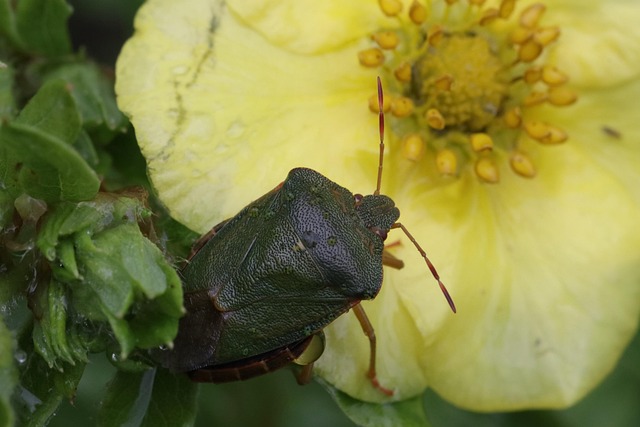Integrated Pest Management (IPM) provides a safe and sustainable approach to residential pest control by combining prevention, monitoring, and strategic use of non-toxic methods. Eco-friendly home pest solutions, focusing on natural predators, plant essential oils, and targeted chemical treatments when necessary, effectively manage pests like rodents, termites, bed bugs, and ants without exposing residents or the environment to harmful chemicals. Residential pest control services employing IPM principles minimize health risks, protect pets and beneficial insects, and maintain a balanced ecosystem. When selecting such services, prioritize companies offering diverse eco-friendly options tailored to specific needs, such as rodent control, termite treatment, bed bug extermination, and ant control, thereby ensuring effective yet responsible pest management for homes.
Looking to protect your home from pests in an eco-conscious way? Discover the power of Integrated Pest Management (IPM) programs tailored for residences. This holistic approach prioritizes safe, sustainable methods over harsh chemicals. From understanding IPM fundamentals to exploring effective control techniques for common pests like rodents, termites, and bed bugs, this guide empowers you to make informed choices. Learn how to select top-notch pest control services that offer both quality results and environmental responsibility.
Understanding Integrated Pest Management (IPM) Programs
Integrated Pest Management (IPM) Programs are a comprehensive approach to residential pest control services, designed to protect your home from various pests like rodents, termites, bed bugs, and ants, while promoting eco-friendly home pest solutions. Unlike traditional pest control methods that often rely heavily on chemical pesticides, IPM takes a more balanced strategy, focusing on prevention, monitoring, and the use of least-toxic methods.
By implementing an IPM program, homeowners can benefit from effective pest control for houses without compromising their health or the environment. This involves regular inspections to identify potential pest entry points, the use of non-chemical repellents and traps, and if necessary, applying targeted chemical treatments only when other methods fail. Such a tailored approach ensures that your home stays pest-free while minimizing the reliance on potentially harmful chemicals.
Benefits of Eco-Friendly Home Pest Solutions
Adopting eco-friendly home pest solutions offers a multitude of benefits for both residents and the environment. By opting for residential pest control services that prioritize sustainability, homeowners can significantly reduce the exposure to harmful chemicals. These methods focus on natural predators, plant essential oils, and other non-toxic strategies to manage pests like rodents, termites, bed bugs, and ants. This approach not only minimizes health risks but also contributes to a healthier living environment.
Moreover, eco-friendly pest control for houses is highly effective in the long term. It helps maintain a balanced ecosystem within and around homes, deterring pests naturally without causing lasting damage. Unlike traditional termite treatments or chemical-heavy bed bug exterminations, these solutions are safe for pets, children, and beneficial insects, making them ideal for households seeking sustainable and comprehensive pest management.
Common Residential Pest Issues and Effective Control Methods
In many residential settings, pests can cause significant damage to homes and pose health risks to occupants. Common residential pest issues include rodents, termites, bed bugs, ants, and various insects. These intruders not only disrupt peace of mind but also require prompt and effective control measures.
Residential pest control services offer eco-friendly home pest solutions that are safe for families and pets. For instance, termite treatment for houses involves targeted applications of pesticides to eliminate these wood-eating pests. Rodent control for homes utilizes a combination of traps, baiting systems, and exclusion techniques to prevent and manage rodent infestations. Bed bug extermination for homes often requires specialized equipment and treatments to eradicate these persistent parasites. Ant control services focus on identifying entry points and applying appropriate insecticides to disrupt ant trails and colonies. By adopting integrated pest management (IPM) programs, homeowners can effectively manage and prevent pest issues while minimizing the use of harmful chemicals.
Choosing the Right Pest Control Services for Your Home
When selecting residential pest control services, it’s crucial to consider your home’s unique needs. Different pests require specific treatments, so finding a company offering a range of eco-friendly home pest solutions is ideal. Look for professionals equipped to handle various issues, from rodent control for homes and termite treatment for houses to bed bug extermination for homes and ant control services. This versatility ensures that no matter the pest invading your space, you have a reliable partner in protection.
Additionally, inquire about their methods and products. Reputable companies prioritize safety and sustainability, offering eco-friendly alternatives that are gentle on both your family and the environment. Avoid firms relying heavily on harsh chemicals; instead, opt for those committed to integrated pest management (IPM) principles, which integrate prevention, monitoring, and targeted treatments for effective yet responsible pest control for houses.
Integrated Pest Management (IPM) offers a comprehensive and eco-conscious approach to residential pest control. By combining various methods, from prevention and exclusion to biological controls and targeted treatments, homeowners can effectively manage pests without resorting to harsh chemicals. This article has explored the benefits of eco-friendly home pest solutions, common issues like rodents, termites, bed bugs, and ants, and guided readers in selecting suitable pest control services. Adopting IPM practices not only protects families’ health but also preserves the environment, ensuring a safer and more sustainable living space.
